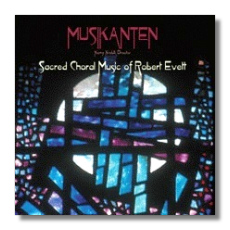
The Internet's Premier Classical Music Source
Related Links
- Evett Reviews
- Latest Reviews
- More Reviews
-
By Composer
-
Collections
DVD & Blu-ray
Books
Concert Reviews
Articles/Interviews
Software
Audio
Search Amazon
Recommended Links
Site News
 CD Review
CD Review
Robert Evett

Musikanten
Sacred Choral Music
- Prime
- What an Attractive Thing Is Judgment
- Propers for the Second Sunday in Lent
- Propers for the First Mass of Christmas
- Vespers
- 4 Marian Antiphons
- Compline
Keith Reas, organ
Musikanten/Kerry Krebill
Innova 555 69:35
Summary for the Busy Executive: Useful beauty.
Those in the D. C. Area of a certain age will remember Robert Evett (1921-1975), composer and newspaper reviewer, as well as regular contributor to Atlantic Monthly and New Republic. He left symphonies, concerti, chamber music, and much choral music. The literary work earned him his living. Evett studied with, among others, Roy Harris and Vincent Persichetti. To me, the choral music on this disc, the only music by Evett I've heard, lies closer to Persichetti than to Harris, particularly to Persichetti's Hymns and Responses for the Church Year.
When Vatican II proclaimed the vernacular mass, the hearts of composers all over the world beat a little faster. The Church had been one of the great musical patrons, and now it essentially asked for a completely new musical wardrobe. This could have led to a prodigious flowering of serious new sacred music. It didn't turn out that way. Most Catholic parishes – in the U.S., at any rate – instead satisfied themselves with the faux folk, kitsch-pop, and anemic (not to mention, often technically incompetent, as far as voice-leading goes), sugary little anthems and mass settings.
What about Catholics who also happened to be real composers? Many have provided alternatives to this great dismal swamp of the third-rate: Dello Joio, Persichetti, Russell Woollen, and Evett. Evett, like Persichetti, not only indulged his Artistic side but took great pains to provide music for the practicalities of worship – pulling off the considerable trick of creating good music within the reach of a church choir. Most works on this CD fall into that category, although in my city, predominately Catholic, no Catholic church has a choir capable of these easy pieces, so thoroughly has the musically simple-minded permeated the service. Catholics, for the most part, are now cut off not only from good new music, they're cut off from their own musical heritage, one of the greatest in the world: Josquin, Obrecht, Ockeghem, Lassus, Palestrina, Byrd, Philips, Victoria, Monteverdi, Bruckner, Mozart, and so on.
The titles on the program may confuse those unfamiliar with Roman Catholic liturgy. Prime refers to the Divine Office, the regimen of worship separated into daily "hours" – those psalms, canticles, hymns, responsories, antiphons, and so on, distinct from the mass. There are eight hours, each with their own set of texts: Matins (between midnight and dawn), Lauds (originally, dawn), Prime (around 6 A.M.), Terce (roughly 9 A.M.), Sext (noon), None (around 3 P.M.), Vespers (sunset), Compline (either immediately after Vespers or before going to bed). Propers are distinguished from the Ordinary. The Ordinary is that part of the service that stays the same, no matter what day it is performed. Thus, the Propers are those texts particular to a specific day of worship. An antiphon usually refers to a syllabic setting of a brief Scriptural text sung before and after a psalm or canticle. The exceptions are the four Marian antiphons: "Alma Redemptoris Mater," "Ave Regina caelorum," "Regina caeli laetare," and "Salve Regina." These are traditionally more elaborate contrapuntally and are often accompanied by organ.
Evett hews rather closely to these definitions. It's an act of humility, denying the demands of the ego and resisting the temptation, for example, to get fancy and still offering the best you have. Judging most of these pieces becomes extremely difficult. They admirably serve their liturgical function, but they do seem aesthetically to be much of the same thing. We have on this CD what amounts to three hours and two sets of propers, all in this same simple style. What you wouldn't notice in a service (because you're dealing with only one set of music) becomes magnified on this CD.
Consequently, my favorite pieces are the ones where Evett lets himself go: What an Attractive Thing Is Judgment and the Marian antiphons. The music is still spare, but not as spare. Nevertheless, even within the settings of the propers and hours, one keeps coming across exquisitely beautiful moments.
Musikanten is a choral ensemble based in Washington, D.C. It highlights American music in general and D.C. composers in particular. It is technically superb, with preternaturally clear diction, attacks and releases in absolute synch, and dead-on intonation. However, the sound itself is a bit light for my taste. The basses are really light, high baritones, and I miss a certain richness in the sound. Nevertheless, this is a matter of preference rather than a real criticism. I am more disturbed by what comes across as a lack of interpretive involvement. However, I don't know whether that's due to the deliberately anonymous nature of most of these pieces, to the "whiteness" of the choral sound, or to the conductor, Ms. Krebill. The group still blows away just about any choir in New Orleans.
Copyright © 2002, Steve Schwartz




















